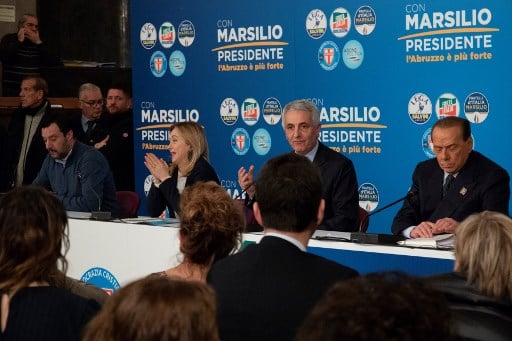Italy's far-right League also triumphed over its Five Star Movement (M5S) coalition partner in a regional vote seen as a test of the parties’ strength.
The local election in Abruzzo, a region east of Rome, was the first in which M5S and the League have been pitted against each other since they formed their uneasy national government coalition last June.
A rightwing League-led alliance that included its old ally, former prime minister Silvio Berlusconi's Forza Italia, took just over 48 percent of the vote, results showed this morning.
The post of Abruzzo regional senator went to the rightwing coalition’s candidate, far-right Brothers of Italy member Marco Marsilio, as predicted by polls ahead of the vote.
The vote in the Abruzzo region laid bare the difficulties for the Five Star Movement (M5S), which was the country's leading party at last year's general election but has seen its popularity recede since taking power in an uneasy coalition with the League.
The anti-immigration League, led by hardline Interior Minister Matteo Salvini, won 28 percent in Abruzzo's local elections on Sunday, compared with 19 percent for M5S, the interior ministry said.
M5S candidate Sara Marcozzi said it was “not a defeat for M5S but for democracy”.

League leader Matteo Salvini. Photo: AFP
The regional vote is seen as a test of strength for both parties ahead of the European elections in May.
Success in the European polls would strengthen the League's hand further, with expectations that this would spur Salvini into “engineering” an early election in a bid to rule alone.
While the M5S won 33 percent in the general election last year, far outstripping the League's 17 percent, it has since watched the rise of Salvini's party.
READ ALSO:
Both M5S head Luigi Di Maio and Salvini had campaigned heavily in the mountainous Abruzzo region ahead of the weekend vote.
The center-left, which has struggled to put up a united front against the populists, had a strong showing with 31 percent.
The League is now favoured by 34 percent of Italian voters, according to an Ipsos poll released today.
Salvini was accused of violating election laws after he posted a tweet on election day asking people in Abruzzo to vote for the League.
No campaigning is allowed the day before the election and while the polls are still open, according to Italian electoral law. As Interior Minister, Salvini is the one responsible for ensuring that this law is followed.
READ ALSO: Matteo Salvini, Italy's rebranded nationalist sharing power with former enemy



 Please whitelist us to continue reading.
Please whitelist us to continue reading.
Member comments